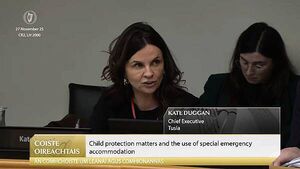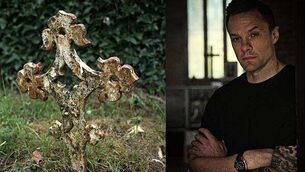Tusla chief apologises for statement issued after alleged sexual assault of girl

By Gráinne Ní Aodha, PA
The chief executive of Tusla has apologised for the wording of a statement issued after the alleged sexual assault of a 10-year-old girl.
Kate Duggan said that she understands the concerns of the wider public after “significant” incidents involving young people who had received State care, but emphasised that most children in care are “thriving”.
She said that several children in care go missing a day, either from school or while on a trip.
Criticisms have been made of the child and family agency, Tusla, after recent incidents involving children.
A young boy, Daniel Aruebose, was reported missing from Dublin after authorities discovered in August that he had not been seen for several years.
The agency had previously engaged with the family of the boy, who would be aged seven this year.
His case prompted a series of “wellbeing checks” carried out on thousands of Tusla cases that were closed during the pandemic, from March 1st 2020 and February 28th 2022, and a rapid review of the boy’s case.
It came a year after Kyran Durnin, who would be nine years old this year if still alive, was reported missing from Co Louth.
In October, Ukrainian teenager Vadym Davydenko died, and two others were taken to hospital following an incident at Tusla emergency accommodation in Dublin.
Further questions were raised of Tusla last month after a 10-year-old girl was allegedly sexually assaulted in west Dublin after being in state care earlier that day.
A statement issued by Tusla following the incident in west Dublin, which said the girl had “absconded” while on a recreational trip with staff in the city centre, “verged on victim blaming”, the Dáil heard at the time.
Chief executive of Tusla Kate Duggan apologised for the statement issued while appearing before the Joint Committee on Children and Equality on Thursday.
“We’ve certainly taken that on board, and I know people have contacted about that,” she said in response to questions from Claire Kerrane.
“So thank you for that, and we do apologise for that statement and the way it was released, and the impact of it, and the wording around it.”
She said she understands “the concerns of the wider public” following “the recent tragic and significant incidents” involving young people Tusla had been engaging with.
“While I cannot comment on the specifics of these cases, as there are ongoing investigations by An Garda Síochána, I can assure you that we are working with An Garda Síochána in relation to these investigations, and all of these cases are being reviewed by the National Review Panel.”
She said that several children abscond from Tusla’s care a day.
“On any particular day, we may have two or three young people who have absconded; they have gotten out.
“They’re supposed to be in school, they left school, they were on a trip, and they bolted and ran.
“So we do have, on any particular day, three or four young people that may have gone on a trip, may have gone to school and don’t come back when they’re supposed to come back, either in terms of their curfew or after their activity.”
She said they then work with the gardaí to locate “those children as quickly as possible”.
Asked by Senator Margaret Murphy O’Mahony if they had considered being reviewed by an external body, Ms Duggan said that they are already externally examined by health watchdog Hiqa.
“Those reports are available and are published on the Hiqa website and are available for anyone to see.
“So as we sit here, and as I set out in my opening statement, we know the really good work that’s been done, and we do need stakeholders like yourselves and other stakeholders to actually talk about some of the good work while challenging us on the very significant problems that we face.”
She said that one of the “very significant” challenges the agency has is in relation to special care orders from the High Court when they do not have the capacity.
“So there’s areas of our services that are working really well, that are fully compliant, but in areas where we do not have the staffing relative to the demand, we are struggling to be compliant.”
She said that the latest figures show there are 5,866 children in the care of Tusla, 87 per cent of whom are in foster care and “who are thriving”.
Nine in 10 of children in State care are in education, she added.
“There is a cohort of young people, perhaps about 100 or 150 young people, with very complex needs and very challenging behaviour that we do really worry about, that we are working really hard to try and accommodate, that we need the support of other agencies and state agencies to be able to better meet their needs.”
She said that 99 per cent of children in State care had been allocated a social worker.
Gerry Hone, national director for services and integration at Tusla, said those who are deemed high priority are the first to be allocated a case worker.
“Case loads can vary, and they can vary anywhere between five cases up to about 20 cases, depending on the workload of the particular worker,” he said.
“We’re very conscious of not giving social workers too much work, or social care workers too many cases where the standard of the work is diluted.”




